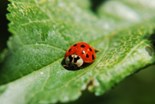Need assistance? Call 800.996.4402

Ladybugs are also known as lady beetles or ladybird beetles. Most species of this beetle family are highly beneficial insects, but some have a habit of overwintering in structures, leading them to become nuisance pests. Ladybugs are found worldwide with about 475 species located in the Unites States and Canada.
Many ladybug species are considered important beneficial insects because they voraciously consume plant-eating insects, such as aphids, mealybugs, mites, and scale insects, which harm crops and plants in gardens. However, a few ladybugs are destructive and feed on plants, such as the Mexican bean beetle and the squash beetle.
Most ladybug species do not pose a health threat to humans. However, the multi-colored Asian lady beetle is known to aggravate asthma and cause allergic reactions in some people, a strong reason for ladybug pest control. In addition, they exude a viscous yellow, foul-smelling defensive fluid that may stain whatever it contacts.
During the spring and summer months, ladybug populations typically grow because the seasons favor tender foliage and aphid infestations. In the autumn, adults seek protected places to overwinter including under leaves, rocks and landscape timbers. Other ladybug species are known to inhabit structures such as buildings and homes.
The most effective way to get rid of ladybugs or prevent them from entering homes and buildings is to seal cracks around windows, doors, siding, and utility pipes, behind chimneys, and underneath the wood fascia and other openings. Use a good quality silicone or silicone-latex caulk. Damaged screens on doors and windows should be repaired or replaced. If ladybugs have already entered a home or building, a vacuum cleaner can aid in their removal. If an infestation has developed inside a home or building, a licensed ladybug pest control operator should be called to evaluate and assess the problem.
For the very best food safety consulting, auditing and training, please visit our strategic partner, CFS Food Safety